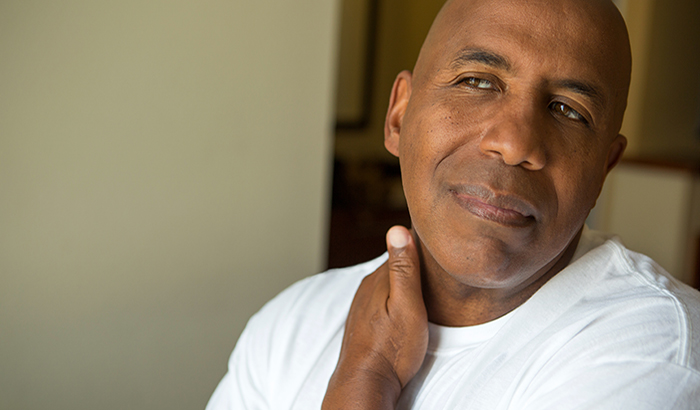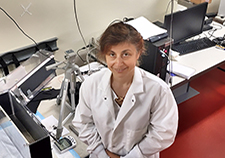Office of Research & Development |
 |


A new VA study is training Veterans' informal caregivers, or "care allies," to deliver massage to ease neck pain. (Photo: © digitalskillet)
June 22, 2017
By Mitch Mirkin
VA Research Communications

In a still image from the training DVD that care allies receive, therapist Erica D. Evans demonstrates a massage technique on project manager Matt Kline. (Photo courtesy of study team)
Ahhh...
That might be the feeling you get just thinking about a soothing, relaxing neck and shoulder massage.
For some, massage is more than a pleasurable stress-reducer; it can be a potent pain reliever.
A 2016 review by VA's Evidence-based Synthesis Program pointed to "potential benefits" of massage for neck and other types of pain, based on past research, but concluded that larger, more rigorous studies are needed.
Now, a new VA study will put massage to the test. The study will have a twist: The focus is on Veterans' caregivers delivering the massages, not professional massage therapists.
"Our training focuses on managing neck pain within the parameters of a 30-minute massage, completed in someone's home"
The study launched this year and will end in 2021. It will enroll 468 Veterans with chronic neck pain. Of these, 156 will sign up with a "care ally" who will do the massaging. The others will be in one of two control arms: a group that gets massages from professional massage therapists, and another that gets wait-listed and receives "usual care" in the meantime.
The research team, from the Richard L. Roudeboush VA Medical Center in Indianapolis and Indiana University School of Health and Rehabilitation Sciences, presented a poster about their study at the 2017 World Congress on Integrative Medicine and Health, held in May in Germany.
The group was led by Dr. Matthew J. Bair, a health-services researcher with a special interest in pain management, and Dr. Niki Munk, a researcher who is also a licensed massage therapist.

The study team believes their approach may be a way around some of the obstacles that patients face in accessing massage as a pain treatment.
"The current evidence shows that the optimal dose of massage for chronic neck pain is multiple, hour-long sessions per week for multiple weeks," says Munk. "From a logistical standpoint, that dose is unattainable for most people," even when cost is taken out of the equation.
That's where caregivers, or "care allies," come in. These could be spouses or other intimate partners, family members, friends, or even paid caregivers.
The study is training them to deliver a specific protocol for neck pain in the convenience of the Veteran's home. They receive a four-hour training session that is reinforced with a workbook and DVD to take home.
"We are not training care allies to be massage therapists," says Munk. "Massage therapists receive much more in-depth training that involves hundreds of hours of classroom and hand-on experience. The training provided in this study is specific to the ally's Veteran partner and their specific pain manifestation. Our training focuses on managing neck pain within the parameters of a 30-minute massage, completed in someone's home. We focus on the safety and comfort of both the Veteran and the ally by teaching a specific massage protocol with instructions for positioning, movement, and techniques."
The Veteran patients are not passive participants in the training. They have certain skills they have to learn, too.
Munk: "Veteran feedback is absolutely essential. This is an item that we address in our training and subsequently reinforce in the workbook and DVD. We teach Veterans and allies how to discuss pressure, spots that are being addressed, pain levels, etc. We want both the Veteran and the ally to know how to get and give this information to ensure everyone's comfort and safety."
One advantage is that no special equipment is needed.
"We teach how to do a seated chair massage with items typically found in the home, such as a kitchen chair and pillows for comfort," explains Munk. "A computer or DVD player to play the training DVD is recommended, especially as the care ally is learning the massage protocol."
The first training session is taking place in July, and the study will progress from there. The researchers don't know yet how many of the Veteran participants will get pain relief, and how fast it will come. Munk says that based on her experience with similar self-care studies, participants may see some improvement right within the initial training session.
What do professional massage therapists think of enlisting amateurs in this way?
"There may be massage therapists that are concerned, but whether this concern comes from a threat to their livelihood or a concern for the safety of the Veteran or care ally is unclear," says Munk. "Ultimately, we believe most professionals in the field recognize the benefit of enlisting care allies and others to provide a means through which those who would otherwise not be able to receive massage can do so. In addition, there are simply not enough massage therapists available to provide the optimal dose of massage to treat everyone with chronic neck pain."
She says her team hopes the care ally approach will prove to be a tool that the massage field can learn to harness and use "for the benefit of all."
VA Research Currents archives || Sign up for VA Research updates